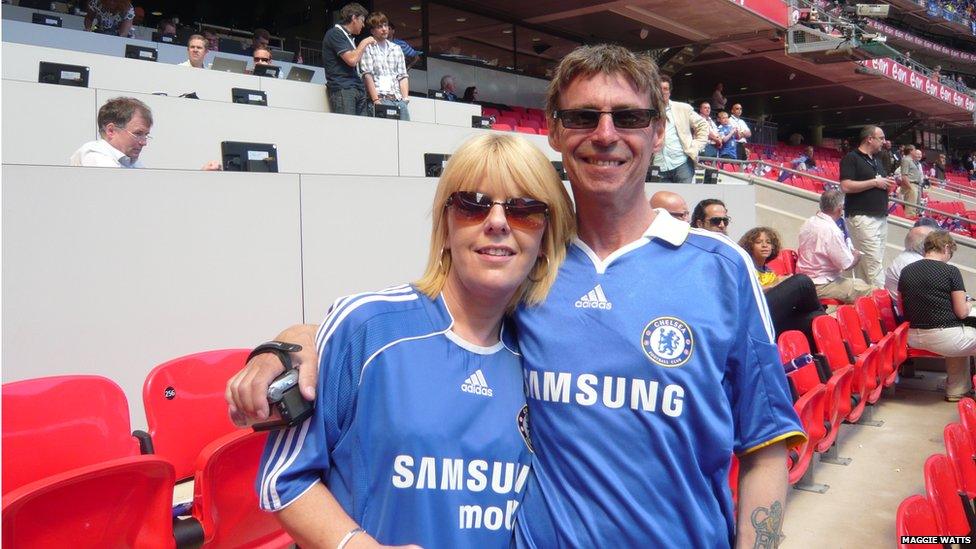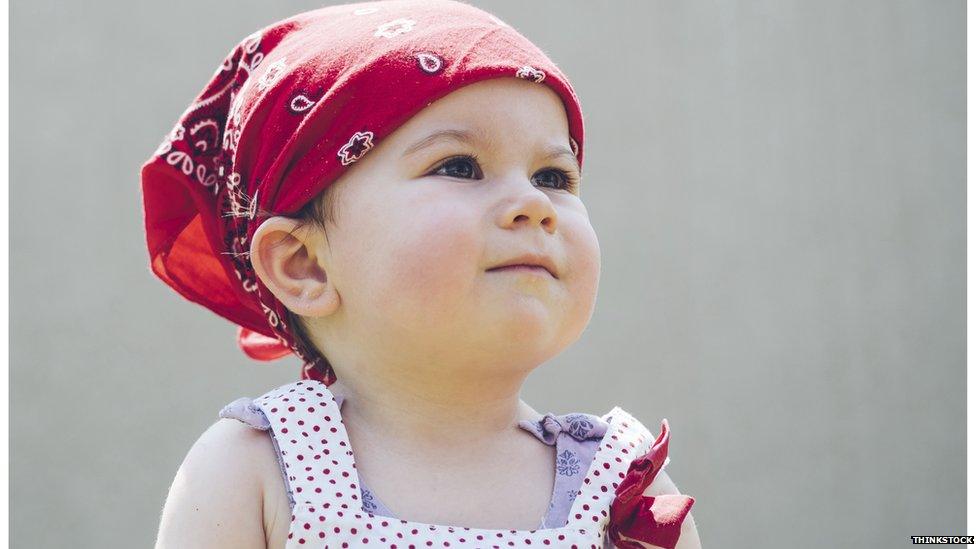Pancreatic cancer drug 'postcode lottery'
- Published

Maggie Watts with her husband, Kevin, who had pancreatic cancer
Kevin Watts lost his mother to pancreatic cancer in 1969. Forty years later, he was diagnosed with the same cancer, and he had little time left to spend with his family.
As became painfully clear to his wife, Maggie, survival rates for pancreatic cancer have hardly changed in 40 years.
"When I looked into it, I was dismayed to discover no progress in terms of survival rate improving," she says.
Maggie Watts is now campaigning to stop a medicine that prolongs life being denied funding on the NHS in England for pancreatic cancer patients.
Her petition, Don't stop funding only drug for pancreatic cancer,, external has gained more than 80,000 signatures.
The drug was not available when her husband was ill. She says even a few more days with him would have meant the world to her.
"When you're given a terminal diagnosis, no time is enough," she says.
In the case of pancreatic cancer - which has no warning signs, meaning the prognosis is poor - any remaining time is particularly precious to get affairs in order, she adds.
'Bit of hope'
The statistics on pancreatic cancer make grim reading.
In the 1970s, 1% of people diagnosed with pancreatic cancer survived their disease beyond 10 years. Today, that figure remains unchanged.
In contrast, few children survived leukaemia 40 years ago, but the survival rate is now 80%.

Survival rates for some cancers, such as childhood leukaemia, have improved dramatically
According to Maggie Watts, the chemotherapy drug Abraxane (nab-paclitaxel) offers patients with pancreatic cancer a "bit of hope".
Abraxane is the only pancreatic drug on the Cancer Drugs Fund, but is about to be removed from the list.
Used alongside conventional chemotherapy, it can extend life by two months or more.
"This is the only bit of hope that has been given in a long time, and it's so unfair that it's been taken away from patients in England but is available in Scotland and Wales," she says.
In Wales, it is a different story.
Paul, from Newport, was diagnosed with pancreatic cancer in the summer of 2014 after showing symptoms of jaundice.
He is waiting to have Abraxane as part of his next course of chemotherapy.
Because he lives in Wales, he will be able to have the treatment on the NHS.
"It's the first real treatment for 17 years that has been shown to be effective against pancreatic cancer," he says.
"With Abraxane, it's a life-prolonging drug, so hopefully it will give me this extra time."
He says he has been warned that his treatment will be "a little bit more fierce" but he thinks the side effects are "a risk worth taking".
"I am very happy to take that choice if it gives me more time with my wife and my family," he says.
"When you're diagnosed, you've got a 5% chance of lasting for a year, I'm well into the 5% and I'd rather like to stay here a little bit longer.
"To have that choice taken away and to say, 'No you can't have it,' is, I think, disgraceful, personally.
"It's a little bit like a postcode lottery: 'If you live in Wales, fine we can give you a bit longer to live, in England, tough'."
'Devastating message'
Abraxane for pancreatic cancer is among a handful of cancer drugs being removed from the Cancer Drugs Fund on 4 November, as the regulator, the National Institute for Health and Care Excellence, external (NICE), struggles to bring the budget for cancer drugs under control.

Pancreatic cancer is often discovered too late to offer the chance of a cure
Existing patients can continue with their treatment, but new patients will have to pay for it privately.
The guidance applies only in England, with patients in Wales and Scotland still eligible for treatment.
NICE has ruled that although the drug is more effective than one of the other treatment options available, it is linked with more side-effects.
"When considering the impact of side-effects on a patient's quality of life and the fact that it is also more expensive, nab-paclitaxel cannot be considered an effective use of NHS resources," chief executive Sir Andrew Dillon said in September.
The decision to remove Abraxane from the Cancer Drugs Fund sends a "devastating message" to pancreatic cancer patients, says Anna Jewell, of the charity Pancreatic Cancer UK, external.
"The system just isn't working for cancers like pancreatic cancer," she says. "We think more emphasis needs to be given to end-of-life treatments."
The charity is calling for an overhaul of the way cancer drugs are funded, as NHS England and NICE prepare a consultation on proposals to reform the system.
Spiralling costs
Set up in 2010 to improve access to cancer therapies not routinely available on the NHS, the Cancer Drugs Fund has exceeded its budget by 50%, yet has no data to show whether it is having any effect on health, according to an investigation by the National Audit Office.
NHS England has previously increased the budget for the fund, from £200m in 2013-14 to £280m in 2014-15 and £340m from April 2015.
According to campaigners, one solution to the spiralling budget is to make drugs more affordable on the NHS.
Kadcyla, a life-prolonging drug for secondary breast cancer, is also being removed from the list in November.
The charity Breast Cancer Now, external is calling on Roche, the drug's manufacturer, to lower its price for Kadcyla so that it can remain on the Cancer Drugs Fund.
Its petition, Women with incurable breast cancer will be denied life-extending drug Kadcyla this November unless we all act now, external, has gained more than 30,000 supporters.
According to Emlyn Samuel, senior policy manager at Cancer Research UK, the current way of funding cancer drugs in the NHS is "disjointed" and "unsustainable".
"We need to bring it back into one system of approvals where NICE leads the process," he says.
"We need that decision-making process to be really robust and transparent so that if a drug is not approved, we can clearly understand the reason why that is the case."
Follow Helen on Twitter, external.
- Published4 September 2015
